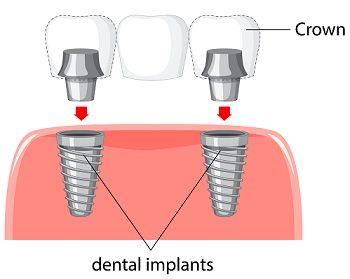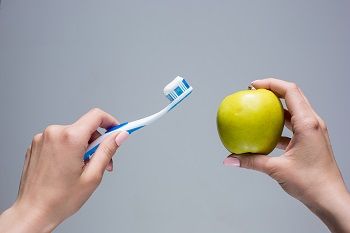How to avoid Dental Bridge problems?
Dental Implants Solutions
A radiant smile can light up a room; dental bridges are crucial in achieving and maintaining that dazzling grin for many. Dental bridges are a reliable solution for replacing missing teeth restoring both function and aesthetics to your oral landscape. However, like any investment, they require proper care and attention to ensure they stand the test of time.
Understanding Dental Bridge Basics
What Is a Dental Bridge?
A dental bridge is a dental appliance that replaces one or more missing teeth. It consists of several key components:
- Pontic: The pontic is the artificial tooth or teeth that replace the missing natural ones. It serves both cosmetic and functional purposes, blending seamlessly with your existing teeth.
- Abutment Teeth: These are the adjacent natural teeth on either side of the gap, which support the bridge. The abutment teeth are typically prepared and fitted with dental crowns.
- Dental Crowns: Crowns are custom-made caps that fit over the abutment teeth, anchoring the bridge. They ensure stability and help distribute the force of chewing evenly.
Types of Dental Bridges
Dental bridges come in different forms to accommodate various needs and conditions:
- Traditional or Fixed Bridges: These are the most common bridges permanently cemented in place. They consist of one or more pontics anchored by dental crowns on adjacent teeth.
- Cantilever Bridges: These are used when adjacent teeth are on only one side of the gap. They rely on a single abutment tooth for support.
- Maryland Bridges (Resin-Bonded Bridges): Maryland bridges often replace front teeth and involve bonding a pontic to the back of adjacent teeth using a metal or porcelain framework.
- Implant-Supported Bridges: Instead of relying on natural teeth for support, implant-supported bridges are attached to dental implants surgically placed in the jawbone. They offer exceptional stability and prevent bone loss.

The Role of Dental Bridges
Dental bridges offer numerous benefits, including:
- Restored Functionality: Bridges enable proper chewing and speaking, preventing issues like eating difficulty and altered speech resulting from missing teeth.
- Enhanced Aesthetics: They fill gaps in your smile, restoring your self-confidence and overall appearance.
- Preventing Shifting: Bridges help prevent adjacent teeth from shifting out of position by occupying the space left by missing teeth.
Common Dental Bridge Problems
1. Bridge Fractures or Chipping: Dental bridges, especially porcelain ones, can sometimes chip or fracture due to excessive force while chewing or biting hard objects. This can compromise the aesthetics and functionality of the bridge.
2. Loose or Ill-Fitting Bridge: The bridge may become loose or develop a poor fit over time. This can occur due to natural changes in your mouth's structure, gum recession, or dental cement or bonding issues.
3. Gum and Tissue Problems: The area beneath and around the dental bridge is susceptible to gum irritation, inflammation, and infection if proper oral hygiene is not maintained. In severe cases, it can lead to periodontal disease.
4. Decay or Cavities Around the Bridge: While the artificial tooth (pontic) of the bridge itself cannot develop cavities, the adjacent natural teeth and the margins of the bridge can be vulnerable to decay if not properly cared for.
5. Sensitivity or Pain: Some individuals may experience sensitivity or discomfort, especially when eating hot or cold foods. This can be due to the dental bridge's interaction with the adjacent teeth and underlying tissues.
6. Wear and Tear: As time passes, normal wear and tear can impact the appearance of your dental bridge. This can include discoloration, surface roughness, and changes in how you bite or chew.
7. Framework or Connector Problems: In the case of resin-bonded bridges, the metal or porcelain framework that holds the pontic in place can weaken or break, leading to the bridge's failure.
8. Allergic Reactions: Some individuals may experience allergic reactions to the materials used in their dental bridges. This can lead to discomfort or inflammation.
9. Floss Thread Fraying: The floss thread used to clean around the bridge may fray or break, making it challenging to maintain proper oral hygiene.
Factors That Contribute to Dental Bridge Problems
Dental bridges are remarkable restorative solutions, but several factors can influence their longevity and effectiveness. Understanding these contributing factors is crucial for preventing dental bridge problems and ensuring oral health. Here are the key factors to consider:
1. Poor Oral Hygiene:
- Neglected Cleaning: Failure to brush and floss properly around and under dental bridges can result in plaque and bacteria buildup, increasing the likelihood of gum disease and decay.
- Special Care: Bridges require special cleaning techniques, such as floss threaders or interdental brushes, to thoroughly clean all areas.

2. Diet and Nutrition:
- Unhealthy Eating Habits: Consuming excessive sugary foods and drinks can promote decay around the bridge and compromise oral health.
- Hard Foods: Chewing on hard or sticky foods can lead to bridge damage or dislodgment. Opt for a balanced diet that's gentle on your dental work.
3. Dental Habits:
- Teeth Grinding (Bruxism): Habitual teeth grinding or clenching can exert excessive force on your bridge, potentially causing fractures or damage.
- Chewing Non-Food Objects: Biting on non-food items like pens or fingernails can harm your bridge.
4. Regular Dental Checkups:
- Missed Appointments: Skipping routine dental checkups can result in undetected issues with your bridge. Routine visits allow your dentist to monitor your bridge's condition and make timely adjustments or repairs.
5. Age and Bridge Longevity:
- Natural Changes: As you age, the structure of your mouth can change, affecting the fit and stability of your bridge. Regular evaluations by your dentist can address these issues.
6. Smoking and Alcohol Consumption:
- Tobacco Use: Tobacco products can increase the risk of gum disease, affecting your bridge's longevity.
- Alcohol: Excessive alcohol consumption can severely affect oral health and overall well-being.
Maintaining Proper Oral Hygiene
One of the most critical aspects of ensuring the longevity and health of your dental bridge is maintaining proper oral hygiene. Good oral hygiene practices help prevent dental bridge problems and improve oral health. Here are the essential steps to keep your bridge and mouth in excellent condition:
1. Brushing:
- Gently clean your natural teeth and the bridge at least twice daily.
- Pay extra attention to where the bridge meets your natural teeth and the gumline.
- Utilize fluoride toothpaste to help protect against decay.
2. Flossing:
- Floss daily to remove food particles and plaque buildup from between your teeth and around the bridge.
- Dental floss threaders or interdental brushes can make flossing around the bridge more effective.
3. Antimicrobial Rinses:
- Consider further using an antimicrobial or fluoride mouthwash to reduce the risk of gum disease and decay.
- Visit your dentist for recommendations on the most suitable rinse for your needs.
4. Dental Tools:
- Invest in dental tools like interdental brushes, soft picks, or water flossers to help clean hard-to-reach areas around the bridge.
5. Regular Dental Checkups:
- Schedule and attend routine dental checkups, typically every six months or as your dentist recommends.
- Your dentist will examine your bridge, clean it professionally, and address any emerging issues promptly.
6. Professional Cleanings:
- Professional cleanings are important for removing plaque and tartar buildup that cannot be effectively managed at home.
- Your dental hygienist will clean both your natural teeth and the bridge.
7. Oral Health Education:
- Ask your dentist or dental hygienist for personalized advice on oral hygiene techniques and tools that best suit your specific needs.
8. Avoid Harmful Habits:
- Avoid chewing on ice, hard candies, or non-food objects, as they can damage your bridge.
- If you grind your teeth (bruxism), discuss treatment options with your dentist to prevent bridge damage.
9. Maintain a Balanced Diet:
- Consume a diet rich in fruits, vegetables, lean proteins, and whole grains while limiting sugary snacks and beverages.
- Proper nutrition supports overall oral health.
10. Tobacco and Alcohol:
- If you smoke or consume alcohol, consider quitting or reducing your intake, as both can negatively impact oral health and the longevity of your bridge.
11. Special Care for Resin-Bonded Bridges:
- If you have a resin-bonded bridge, take extra care when cleaning around the metal or porcelain framework to avoid damage.
By diligently following these steps and partnering with your dentist for routine checkups and professional cleanings, you can maintain proper oral hygiene and significantly reduce the risk of common dental bridge problems. Proper care preserves your bridge and ensures a healthy, confident smile for years.
Conclusion
Your dental bridge is not just a dental solution; it's a gateway to a more confident, comfortable, and fulfilling life. By embracing the knowledge and strategies outlined in this guide, you empower yourself to enjoy the lasting benefits of your dental bridge and maintain a radiant smile for years to come. So, continue your journey towards optimal oral health, and let your smile shine bright.
Contact your dentist in Walnut Creek, Massood Darvishzadeh, DDS at Dental Implant Solutions, to learn more about How to avoid Dental Bridge problems.
Resource:
The pros and cons of dental bridges: Is it the right choice for your smile?
*This media/content or any other on this website does not prescribe, recommend, or prevent any treatment or procedure. Therefore, we highly recommend that you get the advice of a qualified dentist or other medical practitioners regarding your specific dental condition*
Subscribe To Our Newsletter
Get Updates And Learn From The Best
More To Explore



CONTACT US
Massood Darvishzadeh, DDS
2021 Mt Diablo Blvd., Suite 100A
Walnut Creek, CA 94596
(925) 939-2600info@dentalimplantsolutions.net